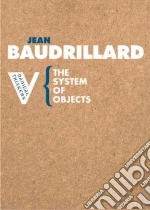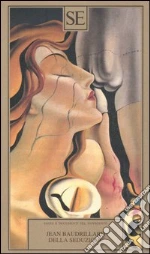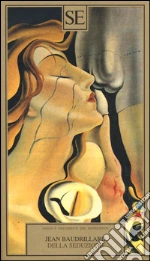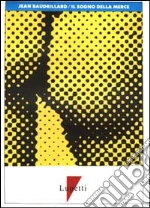 Libri di Jean Baudrillard su Unilibro.it) Libri di Jean Baudrillard su Unilibro.it)
|
|
2007 |
 Title :
L'illusione dell'immortalità
Title :
L'illusione dell'immortalitàAuthor: Baudrillard Jean Publisher: Armando Editore In un mondo di copie e di cloni dove tutto può essere creato all'istante dalla tecnologia, tempo e spazio sembrano annullati e l'umanità proiettata in un futuro virtuale dove l'uomo non lascerà traccia di sé. Immortalità, omologazione e clonazione: questi sono, secondo Baudrillard, i valori fondanti del terzo millennio, il cui passaggio ha rappresentato un'occasione mancata, gettandoci verso un regresso storico, spirituale e culturale. Reso vivace dalle intuizioni, dalle visioni profetiche e dal sarcasmo che contraddistinguono lo stile di Baudrillard, L'illusione dell'immortalità esprime le contraddizioni che guidano la cultura contemporanea e regolano le nostre vite. € 15,00
Scontato: € 14,25
|
 Title :
Le strategie fatali
Title :
Le strategie fataliAuthor: Baudrillard Jean Publisher: SE "L'enigma si è capovolto: una volta era la Sfinge che poneva all'uomo la domanda dell'uomo, che Edipo ha creduto di risolvere, che tutti noi abbiamo creduto di risolvere, oggi è l'uomo che pone alla Sfinge, all'inumano, la domanda dell'inumano, del fatale, della disinvoltura del mondo verso le nostre azioni, della disinvoltura del mondo verso le leggi oggettive. L'oggetto (la Sfinge), più sottile, non risponde. Ma bisogna pure che disobbedendo alle leggi, eludendo il desiderio, risponda in segreto a qualche enigma. Che cosa resta se non il volgerci dalla parte di questo enigma?". La catastrofe è già avvenuta, siamo oltre: a questo riconoscimento deve seguire, per Jean Baudrillard (1929-2007), il tentativo di pensare la nostra nuova condizione senza ricorrere a categorie superate. La scena della storia, dello scambio, del fantasma, del politico, del corpo sono finite; con la loro scomparsa ogni radicalità critica è diventata inutile. Non è più il modo di produzione, è il modo di sparizione a essere avvincente; e, in generale, le cose visibili non trovano fine nell'oscurità e nel silenzio, ma svaniscono nel più visibile del visibile, l'oscenità. Nell'iperreale - la forma estatica di un reale non più frenato dall'illusione - si installano l'inerzia, l'escrescenza, l'ipertelia, l'effetto speciale: le cose, svincolate dalla loro essenza, proliferano all'infinito, si potenziano, assumono una curvatura malefica che mette fine all'orizzonte del senso. € 19,50
|
 Title :
Fragments
Title :
FragmentsAuthor: Baudrillard Jean Publisher: Random House Inc This third book in the Cool Memories series is culled from Baudrillard's notebooks in the period when he was composing The Illusion of the End and The Perfect Crime.In it, he resumes his investigation of the meta-metaphysics of objects.Like its predecessors, the book is a work of brief meditations, ofpoetic musings: in a word, of fragments. € 11,60
|
|
2006 |
 Title :
Utopia Deferred
Title :
Utopia DeferredAuthor: Baudrillard Jean, Kendall Stuart (TRN) Publisher: Semiotext The Utopie group was born in 1966 at Henri Lefebvre's house in the Pyrenees. The eponymous journal edited by Hubert Tonka brought together sociologists Jean Baudrillard, René Lourau, and Catherine Cot, architects Jean Aubert, Jean-Paul Jungmann, Antoine Stinco, and landscape architect Isabelle Auricoste. Over the next decade, both in theory and in practice, the group articulated a radical ultra-leftist critique of architecture, urbanism, and everyday life. Utopia Deferred collects all of the essays Jean Baudrillard published in Utopie as well as recent interviews with Jean Baudrillard and Hubert Tonka.Utopie served as a workshop for Baudrillard's thought. Many of the essays he first published in Utopie were seminal for some of his most shockingly original books: For a Critique of the Political Economy of the Sign, The Mirror of Production, Simulations, Symbolic Exchange and Death, and In the Shadow of the Silent Majorities. But Utopie was also a topical journal and a political one; the topics of these essays are often torn from the headlines of the tumultuous decade following the uprisings of May 1968. € 16,10
|
 Title :
The Universitas Project
Title :
The Universitas ProjectAuthor: Ambasz Emilio, Paz Octavio, Baudrillard Jean, Eco Umberto, Schapiro Meyer Publisher: Museum of Modern Art € 31,20
|
 Title :
Il patto di lucidità o l'intelligenza del male
Title :
Il patto di lucidità o l'intelligenza del maleAuthor: Baudrillard Jean Publisher: Raffaello Cortina Editore Se il terrorismo è il male, è di comprendere il male che abbiamo bisogno. Il testo indica dunque contemporaneamente la comprensione che dobbiamo avere del dispiegarsi del male nella natura e nella storia ma anche l'astuzia di cui possono dar prova coloro che sono l'incarnazione stessa del male: i terroristi. L'autore propone così il suo "patto di lucidità", che dovrebbe liberarci dall'illusione di poter sradicare una volta per sempre il male da questo mondo, magari usando guerra e repressione. € 19,00
|
|
2005 |
 Title :
System of Objects
Title :
System of ObjectsAuthor: Jean Baudrillard Publisher: VERSO Pressing Freudian and Saussurean categories into the service of a basically Marxist perspective, The System of Objects offersa cultural critique of the commodity in consumer society. Baudrillardclassifies the everyday objects of the "new technical order" asfunctional, nonfunctional and metafunctional. He contrasts "modern" and"traditional" functional objects, subjecting home furnishing andinterior design to a celebrated semiological analysis. His treatment ofnonfunctional or "marginal" objects focuses on antiques and thepsychology of collecting, while the metafunctional category extends tothe useless, the aberrant and even the "schizofunctional." Finally,Baudrillard deals at length with the implications of credit andadvertising for the commodification of everyday life. The System of Objectsis a tour de force of the materialist semiotics of the earlyBaudrillard, who emerges in retrospect as something of a lightning rodfor all the live ideas of the day: Bataille's political economy of"expenditure" and Mauss's theory of the gift; Reisman's lonely crowdand the "technological society" of Jacques Ellul; the structuralism ofRoland Barthes in The System of Fashion; Henri Lefebvre's workon the social construction of space; and last, but not least, GuyDebord's situationist critique of the spectacle. € 12,00
|
 Title :
The Singular Objects of Architecture
Title :
The Singular Objects of ArchitectureAuthor: Baudrillard Jean, Nouvel Jean, Bononno Robert (TRN), Hays K. Michael (FRW) Publisher: Univ of Minnesota Pr What is a singular object? An idea, a building, a color, a sentiment, a human being. Each in turn comes under scrutiny in this exhilarating dialogue between two of the most interesting thinkers working in philosophy and architecture today. From such singular objects, Jean Baudrillard and Jean Nouvel move on to fundamental problems of politics, identity, and aesthetics as their exchange becomes an imaginative exploration of the possibilities of modern architecture and the future of modern life. Among the topics the two speakers take up are the city of tomorrow and the ideal of transparency, the gentrification of New York City and Frank Gehry’s surprising Guggenheim Museum in Bilbao. As Nouvel prompts Baudrillard to reflect on some of his signature concepts (the virtual, transparency, fatal strategies, oblivion, and seduction, among others), the confrontation between such philosophical concerns and the specificity of architecture gives rise to novel and striking formulations—and a new way of establishing and understanding the connections between the practitioner and the philosopher, the object and the idea. This wide-ranging conversation builds a bridge between the fields of architecture and philosophy. At the same time it offers readers an intimate view of the meeting of objects and ideas in which the imagined, constructed, and inhabited environment is endlessly changing, forever evolving. Jean Baudrillard is one of the most influential thinkers of his generation and author of The Vital Illusion (2001). Jean Nouvel has designed buildings throughout the world, including the new Guthrie Theater in Minneapolis, and is a recipient of France’s Grand Prix d’Architecture. Robert Bononno, a translator and teacher, lives in New York City. € 16,10
|
 Title :
The Conspiracy of Art
Title :
The Conspiracy of ArtAuthor: Baudrillard Jean, Lotringer Sylvere Publisher: Semiotext The images from Abu Ghraib are as murderous for America as those of the World Trade Center in flames. The whole West is contained in the burst of sadistic laughter of the American soldiers, as it is behind the construction of the Israeli wall. This is where the truth of these images lies. Truth, but not veracity. As virtual as the war itself, their specific violence adds to the specific violence of the war.In The Conspiracy of Art, Baudrillard questions the privilege attached to art by its practitioners. Art has lost all desire for illusion: feeding back endlessly into itself, it has turned its own vanishment into an art unto itself. Far from lamenting the "end of art," Baudrillard celebrates art's new function within the process of insider-trading. Spiraling from aesthetic nullity to commercial frenzy, art has become transaesthetic, like society as a whole.Conceived and edited by life-long Baudrillard collaborator Sylvère Lotringer, The Conspiracy of Art presents Baudrillard's writings on art in a complicitous dance with politics, economics, and media. Culminating with "War Porn," a scathing analysis of the spectacular images from Abu Ghraib prison as a new genre of reality TV, the book folds back on itself to question the very nature of radical thought. € 15,20
|
|
2004 |
 Title :
La violenza del mondo. La situazione dopo l'11 settembre
Title :
La violenza del mondo. La situazione dopo l'11 settembreAuthor: Baudrillard Jean; Morin Edgar Publisher: Ibis All'lnstitut du Monde Arabe, a Parigi, due dei più brillanti intellettuali francesi, un sociologo e un filosofo, si confrontano in due conferenze sui temi dell'attualità mondiale: com'è cambiato il mondo dopo l'11 settembre? Come reagire agli eventi? Come immaginare un futuro di pace? L'eleganza e la linearità della riflessione dei due pensatori coinvolge e stimola. Ma capire il presente e immaginare il futuro significa anche riflettere sul passato, cogliere nel passato ciò che ci porta all'oggi. Da cosa derivano questi eventi terribili? Che possiamo ricavarne per superare tutto questo? Le domande che ci angosciano trovano qui, se non una risposta (ma chi potrebbe darla?), quanto meno un'attenta valutazione e molte indicazioni di approfondimento critico. € 9,00
|
|
|
2003 |
 Title :
Cool Memories 1995-2000
Title :
Cool Memories 1995-2000Author: Baudrillard Jean, Turner Chris (TRN) Publisher: Verso Books € 17,20
|
 Title :
Il sistema degli oggetti
Title :
Il sistema degli oggettiAuthor: Baudrillard Jean Publisher: Bompiani Arredamento, automobili, gadget, pezzi d'antiquariato, elettrodomestici: l'immenso universo degli oggetti che ci circondano si costituisce in un coerente sistema di segni che circoscrive e regola le condotte e le ideologie di una società dei consumi. € 9,00
|
 Title :
Architettura e nulla. Oggetti singolari. Ediz. illustrata
Title :
Architettura e nulla. Oggetti singolari. Ediz. illustrataAuthor: Baudrillard Jean; Nouvel Jean Publisher: Electa Il 21 maggio 1997 si è tenuto il primo incontro tra il filosofo Jean Baudrillard e l'architetto Jean Nouvel nell'Ecole de Architecture di Paris-La Villette. La prima parte di questo volume è, di questo colloquio, la trascrizione. La seconda parte ospita invece la trascrizione delle conversazioni che i due intellettuali hanno avuto tra dicembre 1998 e gennaio 1999. € 15,00
|
 Title :
E l'oggetto che vi pensa
Title :
E l'oggetto che vi pensaAuthor: Baudrillard Jean Publisher: Pagine d'Arte "La fotografia è il nostro esorcismo. La società primitiva aveva le maschere, la società borghese gli specchi, noi abbiamo le immagini... Credi di fotografare una scena per puro piacere - in realtà è la scena a voler essere fotografata... Poiché è l'oggetto a vederci, è l'oggetto a sognarci. Il mondo ci riflette, il mondo ci pensa. La magia della fotografia sta nel fatto che tutta l'opera la fa l'oggetto." (Jean Baudrillard) € 25,00
|
 Title :
Power inferno. Requiem per le Twin Towers. Ipotesi sul terrorismo. la violenza globale
Title :
Power inferno. Requiem per le Twin Towers. Ipotesi sul terrorismo. la violenza globaleAuthor: Baudrillard Jean Publisher: Raffaello Cortina Editore Contro le interpretazioni correnti dell'11 settembre, ma anche rispondendo alle letture «revisioniste» (le Torri sono crollate per un complotto interno della CIA), Baudrillard, sulla scia di «Lo spirito del terrorismo», riconsidera il fenomeno all'interno del Nuovo Ordine Globale. La potenza simbolica dell'attacco alle Twin Towers è moltiplicata dalla disperazione: quella dei dannati della Terra ma anche quella suscitata nel cuore stesso dell'Impero dalla sottomissione a una tecnologia integrale, a una realtà virtuale schiacciante. In questo senso il terrorismo «è il verdetto e la condanna che la nostra società pronuncia su se stessa». € 8,50
Scontato: € 8,08
|
 Title :
Passwords
Title :
PasswordsAuthor: Baudrillard Jean, Turner Chris (TRN) Publisher: W W Norton & Co Inc In his analysis of the deep social trends rooted in production, consumption, and the symbolic, Jean Baudrillard touches the very heart of the concerns of the generation currently rebelling against the framework of the consumer society. With the ever-greater mediatization of society, Baudrillard argues that we are witnessing the virtualization of our world, a disappearance of reality itself, and perhaps the impossibility of any exchange at all. This disenchanted perspective has become the rallying point for all those who reject the traditional sociological and philosophical paradigms of our age. Passwords, in the spirit of Gilles Deleuze's Abecedaire, offers us twelve accessible and enjoyable entry points into Baudrillard's thought by way of the concepts he uses throughout his work: the object, seduction, value, impossible exchange, the obscene, the virtual, symbolic exchange, the transparency of evil, the perfect crime, destiny, duality, and thought. € 16,00
|
|
2002 |
 Title :
Screened Out
Title :
Screened OutAuthor: Baudrillard Jean, Turner Chris (TRN) Publisher: Random House Inc 'Watching the president's Christmas message produces this necropolar, white-mass sensation. Seeing the video broadcast of the Christmas service in the cathedral itself, with these pathetic screens and the young worshippers slumped around them here and there, you tell yourself that God and religion deserved better. Deserved to die, yes, but not this. However, watching the presidential figure and his sonorous inanity, you tell yourself that here at least you got what you deserved. Chirac is useless - that goes without saying - but so are we all ... Uselessness of this kind has no origin: it exists immediately, reciprocally; like a shared secret, you savour it implicitly - with its warm bitterness - particularly in these cold snaps, as the very essence of the social bond. Sanctioned by that other interactive uselessness - the uselessness of the screen.' World-renowned for his lively and often iconoclastic reading of contemporary culture and thought, Jean Baudrillard here turns his hand to topical political debates and issues. In this stimulating collection of journalistic essays Baudrillard addresses subjects ranging from those already established as his trademark (virtual reality, Disney, television) to more unusual topics such as the Western intervention in Bosnia, children's rights, Holocaust revisionism, AIDS, the Rushdie fatwa, Formula One racing, mad cow disease, genetic cloning, and the uselessness of Chirac. These are coruscating and intriguing articles, not least because they show that Baudrillard is - pace his critics - still susceptible and alert to influences from social movements and the world beyond the hyperreal. € 21,00
|
 Title :
Lo spirito del terrorismo
Title :
Lo spirito del terrorismoAuthor: Baudrillard Jean Publisher: Raffaello Cortina Editore Con gli attentati di New York ci troviamo di fronte all'evento assoluto, l'evento puro che concentra in sé tutti quelli che non hanno mai avuto luogo. Si potrebbe dire che la realtà è gelosa della finzione, che il reale è geloso dell'immagine. E' una specie di duello, a chi sarà il più imprevedibile. Che noi abbiamo sognato questo evento, dato che non si può non sognare la distruzione di una potenza divenuta egemone, è inaccettabile per la coscienza morale dell'Occidente, ma è tuttavia un fatto, che si misura appunto dalla violenza patetica dei discorsi che vogliono negarlo. € 6,50
Scontato: € 6,18
|
 Title :
Parole chiave
Title :
Parole chiaveAuthor: Baudrillard Jean; Biolghini G. (cur.) Publisher: Armando Editore L'oggetto, il valore, la seduzione, l'osceno, la trasparenza del male, il virtuale, il caos, la fine, il destino, il pensiero, la dualità: un libro accessibile, scritto in piena libertà stilistica, che spiega i principali concetti filosofici della riflessione di Jean Baudrillard. € 9,00
|
 Title :
L'autre. Ediz. illustrata
Title :
L'autre. Ediz. illustrataAuthor: Delahaye Luc; Baudrillard Jean Publisher: Phaidon € 35,00
|
||
|
2001 |
 Title :
Jean Baudrillard
Title :
Jean BaudrillardAuthor: Baudrillard Jean Publisher: Stanford Univ Pr This is an expanded edition of the first comprehensive overview of the work of Jean Baudrillard, one of the most fascinating thinkers on the French intellectual scene. To the original selection of his writings from 1968 to 1985, this new edition adds examples of Baudrillard's work since that time. Reviews of the First Edition ?This is a good book, and the author of its selected writings, Jean Baudrillard, deserves only a share of the compliment. It is difficult to introduce a difficult author, and Mark Poster has done a brilliant job. He has selected wisely from Baudrillard's writings. . . . More important, Poster has written what may be, pound for pound, the best introduction to a social theorist I have read. . . . Poster has somehow said everything the uninitiated needs to know before deciding to read Baudrillard.”?Contemporary Sociology ?Following the lead of thinkers such as Foucault, Derrida, and Deleuze, Baudrillard engages in a task of pointing away from any traditional sociological themes. His writings demand that one turn away from convenient or customary interpretations of society and, in the process, one is forced to use his or her imagination in new ways.”?Choice ?Poster's Introduction presents what is probably as clear and intelligent an exposition of Baudrillard's ideas as you'll find anywhere.”?Philosophy and Literature € 28,10
|
|
|
2000 |
 Title :
The Vital Illusion
Title :
The Vital IllusionAuthor: Baudrillard Jean, Witwer Julia Publisher: Columbia Univ Pr Aren't we actually sick of sex, of difference, of emancipation, of culture? With this provocative taunt, the indomitable sociologist Jean Baudrillard challenges us to face up to our deadly, technologically empowered renunciation of mortality and subjectivity as he grapples with the complex issues that define our postmillennial world. What does the advent and proliferation of cloning mean for our sense of ourselves as human beings? What does the turn of the millennium say about our relation to time and history? What does the instantaneous, virtual realm of cyberspace do to reality? In The Vital Illusion -- as always -- Baudrillard leads his readers to some surprising conclusions. Baudrillard considers how human cloning -- as well as the "cloning" of ideas and social identities -- heralds an end to sex and death and the divagations of living by instituting a realm of the Same, beyond the struggles of individuation. In this day and age when everything can be cloned, simulated, programmed, and genetically and neurologically managed, humanity shows itself unable to brave its own diversity, preferring instead to regress to the pathological eternity of self-replicating cells. By reverting to our viral origins as sexless immortal beings, we are, ironically, fulfilling a death wish, putting an end to our own species as we know it. Next, Baudrillard explores the "nonevent" that was and is the turn of the millennium. He provocatively puts forward the thesis that the arrival of the year 2000 could never take place because we could neither resolve nor leave behind our history, nor could we stop counting down toward our future. For Baudrillard, the millennial clock reading to the millionth of a second on its way to zero is the perfect symbol of our time: history decays rather than progresses. In closing, Baudrillard examines what he calls "the murder of the real" by the virtual. In a world of copies and clones in which everything can be made present in an instant by technology, we can no longer even speak of reality. Beyond Nietzsche's symbolic murder of God, our virtual world free of referents is in the process of exterminating reality, leaving no trace: "The corps(e) of the Real -- if there is any -- has not been recovered, is nowhere to be found." Peppered with Baudrillard's signature counterintuitive moves, prophetic visions, and dark humor, The Vital Illusion exposes the contradictions that guide our contemporary culture and rule our lives. € 30,10
|
 Title :
Lo scambio impossibile
Title :
Lo scambio impossibileAuthor: Baudrillard Jean Publisher: Asterios € 15,00
|
 Title :
America
Title :
AmericaAuthor: Baudrillard Jean; Guarino L. (cur.) Publisher: SE "L'America esorcizza la questione dell'origine, non ha il culto dell'origine né il mito dell'autenticità, non ha un passato né una verità fondatrice. Non avendo conosciuto l'accumulazione primitiva del tempo, vive in una perenne attualità. Non avendo conosciuto l'accumulazione lenta e secolare del principio di verità, vive nella simulazione perpetua, nella perenne attualità dei segni. Essa non ha un territorio ancestrale; quello degli indiani è oggi circoscritto entro i limiti delle riserve che sono l'equivalente dei musei dove sono stipati i Rembrandt e i Renoir. Ma tutto questo non ha importanza l'America non ha problemi identità. La potenza futura è riservata ai popoli senza origine che sapranno sfruttare sino in fondo questa situazione." € 17,00
|
|
1999 |
 Title :
Taccuini 1990-1995
Title :
Taccuini 1990-1995Author: Baudrillard Jean Publisher: Costa & Nolan € 7,80
|
 Title :
Cyberfilosofie. Fantascienza, antropologia e nuove tecnologie
Title :
Cyberfilosofie. Fantascienza, antropologia e nuove tecnologieAuthor: Baudrillard Jean Publisher: Mimesis € 11,88
|
|
1997 |
 Title :
Della seduzione
Title :
Della seduzioneAuthor: Baudrillard Jean Publisher: SE La seduzione è sempre all'erta, pronta a distruggere ogni ordine divino, foss'anche quello della produzione o del desiderio. Per tutte le ortodossie la seduzione continua a rappresentare il maleficio e l'artificio, una magia nera che perverte tutte le verità, una congiura di segni, un'esaltazione dei segni nella loro utilizzazione malefica. Ogni discorso è minacciato da questa improvvisa reversibilità o assorbimento nei propri segni, senza traccia di senso. È per questo che tutte le discipline, il cui assioma sia costituito dalla coerenza e dalla finalità del proprio discorso, non possono che esorcizzarla. Ed è qui che seduzione e femminilità si confondono, si sono sempre confuse. € 19,00
|
 Title :
Della seduzione
Title :
Della seduzioneAuthor: Baudrillard Jean Publisher: SE La seduzione è sempre all'erta, pronta a distruggere ogni ordine divino, foss'anche quello della produzione o del desiderio. Per tutte le ortodossie la seduzione continua a rappresentare il maleficio e l'artificio, una magia nera che perverte tutte le verità, una congiura di segni, un'esaltazione dei segni nella loro utilizzazione malefica. Ogni discorso è minacciato da questa improvvisa reversibilità o assorbimento nei propri segni, senza traccia di senso. È per questo che tutte le discipline, il cui assioma sia costituito dalla coerenza e dalla finalità del proprio discorso, non possono che esorcizzarla. Ed è qui che seduzione e femminilità si confondono, si sono sempre confuse. € 21,00
|
|
1996 |
 Title :
Il delitto perfetto. La televisione ha ucciso la realtà?
Title :
Il delitto perfetto. La televisione ha ucciso la realtà?Author: Baudrillard Jean Publisher: Raffaello Cortina Editore Scrittura, calcolo, immagine, informazione: la storia della rappresentazione del mondo sembra arrivata al suo compimento e il mondo sta scomparendo, inghiottito dalla sua immagine riprodotta, come fosse un buco nero. E' questo il "delitto perfetto" di cui parla il testo, la "risoluzione anticipata" del mondo per clonazione della realtà e sterminio del reale da parte del suo doppio. Che fare dunque? Bruciare la televisione o sparare a delle immagini virtuali, come fa lo sfortunato eroe di Videodrome di Cronenberg? Per fortuna, come insegna Sherlock Holmes, il delitto perfetto non esiste: in ogni crimine c'è un dettaglio che stona. Sta al lettore di Braudillard scoprirlo. € 18,00
Scontato: € 17,10
|
|
|
1995 |
 Title :
Il sogno della merce
Title :
Il sogno della merceAuthor: Baudrillard Jean Publisher: Lupetti Dove ci porterà questa pubblicità? Secondo l'autore si può chiamare pubblicità qualsiasi operazione che trasforma un oggetto o un'idea in uno scambio simbolico fra noi e una madre che cerca di tranquillizzare il suo bambino. La pubblicità e la "volgarizzazione" di un desiderio fusionale, la ricerca di una felicità impossibile ma vissuta magicamente come vera. Ma la pubblicità può definirsi stupida o intelligente? I propositi sono buoni solo che a giocare su questi termini di stupidità o intelligenza, oppure di buono o cattivo, secondo l'autore, ha lo stesso valore, e un modo in apparenza differente di collocarsi nel teatro delle merci. € 9,00
Scontato: € 8,55
|
|

|

|

|

|